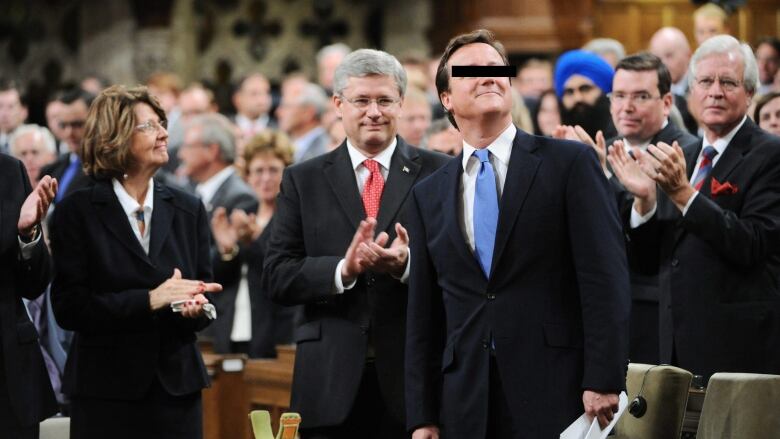David Cameron's 'top-secret' visit to Canada revealed
Access to Information request results in redaction of name of British PM on official visit to Canada

The Privy Council Office, it seems, is working hard to protect the identity of those who visit the prime minister.
According to documentsrecently released under Access to Information, the name of an individual who paid an officialvisit to Canada in September2011 must be withheld because it is considered"personal information."
Owing to an apparent clerical error, however, CBC News has uncovered the identity of the mystery world leader in question. Onepage in the batch of documents was printed in duplicate:one time with names blanked out andthe other with the namesreadable.
The documents (included below), show the deletion was meant to be"Prime Minister Cameron,"presumably referringto British Prime Minister David Cameron.
Clues to identity
Another strong hint confirming this theorycan be found in the original request made by the CBC in June2012, which asked for documents pertaining to U.K. Prime Minister David Cameron's official visit to Ottawa on Sept.22, 2011.

After taking nearly twoyears to process the request, the Privy Council Office returned 50 pages of heavily redacted material.
Deletions includevirtually all entries under the headings "Possible Controversies," "Draft Agenda" and a list of possible agenda items for a bilateral meeting.
Other pieces of undisclosed information seem far less contentious.
(REDACTED)'s public activities
One note addressed to Prime Minister Stephen Harper directly reads,"(REDACTED)will greet (REDACTED)at the airport and you will greet him at Confederation Square to witness a 19-gun salute and to review the honour guard."
"(REDACTED)will lay a wreath at the Tomb of the Unknown Soldier," the note continues, and concludes:"All of the above will be open to the media."

Media were indeed given access to the events the documents now detail,and footage from CBC archives of the day show that then defence minister Peter MacKay was the person meeting Cameron at the airport on behalf of the government of Canada, and it was Cameron who laid the wreath.
Last month, Information CommissionerSuzanne Legault chastised the government's handling of Access to Information requests after she found evidence of "systematic interference" by three Conservative staff members.
Access to Information crusader and research expert Ken Rubin said he doesn't believe this particular case involved interference, but thatremoving the names of publicly known figures is thesign of a broken system.
Privacy or 'dumb response'?
"Perhaps that's the whole point of the current Access Act it's fairly broken and people go to the extremes, not just of creative avoidance but of just dumb responses."
In justifying the redaction of Cameron's name, the Privy Council Office cited Section 19(1) of the Access to Information Act, which protects the privacy of individuals who don't work for the federal government and are acting in that capacity.
The rule provides exceptions, however,in cases where peopleconsentto their identity being revealed or if they arepublicly recognizable figures.
In a statement provided to CBC, the Privy Council Office said it handles all personal information in the context of both the Access to Information Act and the Privacy Act. It added that "Personal information that is publicly available in one instance does not mean that it can always be released if it is present in a PCO document."
An overly strict interpretation of the rules surrounding the name of a world leader on a public visit calls into question all of the redactions in the government's release.
Rubin saidthe approachundermines the whole Access to Information system.
"There's so many things wrong with the current act that you really have to start anew and address things so that you're not going to feel that the main goals are deception, delay, and deceit."
Mobile users click here to view documents












_(720p).jpg)


 OFFICIAL HD MUSIC VIDEO.jpg)
.jpg)



























































































